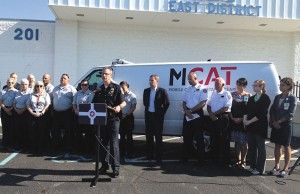INDIANAPOLIS — The Indiana University Public Policy Institute published a report on the pilot of the Mobile Crisis Assistance Team (MCAT) recently. MCAT is based on an integrated health care model, bringing together the expertise of a police officer, a paramedic, and a licensed clinician for a 24/7 response to legal, behavioral health, substance use, and medical crises. The first MCAT units were deployed in IMPD East District in August of 2017. The analysis reports preliminary signs of success, points to next steps for the program, and highlights areas of opportunity for further criminal justice system reform.
“The Mobile Crisis Assistance Team was created to improve our response to crisis situations and work proactively in the community, providing help to those in need – and the results are promising,” said Mayor Hogsett. “But our work is far from over. This report will inform the next steps we take to both improve the MCAT program and ultimately achieve holistic reform of the criminal justice system in Indianapolis.”
A research team from the Center for Criminal Justice at the IU Public Policy Institute, led by Dr. Brad Ray and Katie Bailey, evaluated the pilot program using data from MCAT run reports between August 1 and December 9, 2017. Additionally, researchers surveyed IMPD officers, interviewed key stakeholders and program designers, held focus groups with MCAT team members, and completed field observations.
According to the report, the average age of cases handled by the MCAT teams was about 38. A majority — 55 percent — were white, and 58 percent were male. Nearly a third of responses were from IMPD officers on the scene. The top three primary crises they responded to were mental health issues, overdose or substance abuse calls, and self-harming behaviors. The majority of runs in the study months — 56 percent — resulted in transportation to a hospital. Only two percent were taken to jail.
Key findings from the report include:
• MCAT units were able to relieve one or more other first response units from the scene of an emergency in two-thirds of all runs during the study period.
• Eighty-five percent of IMPD East District police officers surveyed indicated the MCAT unit was very useful or extremely useful to them as an additional resource in responding to emergencies.
• A lack of outpatient treatment options and clear policies and procedures appeared as the most salient barriers to implementation of the MCAT pilot program.
• Access to and triangulation of collaborating agency information on persons experiencing emergencies; support from city officials; and team building exercises during MCAT training emerged as the most salient facilitators to implementation of the MCAT pilot program.
The MCAT pilot began on August 1, 2017, following two months of an in-depth training program that immersed MCAT team members in subjects ranging from mental health and addiction, to homelessness and veterans’ issues. The coordinated response to crises was designed to improve treatment outcomes and assist individuals in making informed choices and returning to a healthy equilibrium, with the ultimate goal of diversion from arrest and connection with social services and treatment. The pilot ran in IMPD’s East District, an area that ranks high on the Social Disorder Index with frequent mental and emotional 911 calls and a high volume of ambulance runs for medical emergencies.
MCAT is part of Mayor Joe Hogsett’s plan for comprehensive criminal justice reform, which includes implementing national best practices, responding to community feedback, and identifying opportunities for systemic change. The proposed reforms include the creation of an Assessment and Intervention Center as part of the future Community Justice Campus, which aims to bring together City agencies and community service providers in one facility to divert those suffering from mental illness and addiction in the criminal justice system into treatment options, filling a gap identified in the MCAT pilot report.
The Indianapolis Metropolitan Police Department, Indianapolis Emergency Medical Services, Midtown Community Mental Health, and the Office of Public Health and Safety – will continue to analyze the report’s findings and determine next steps for the MCAT program and other collaborative criminal justice reform efforts.



